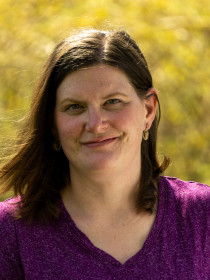Connect with Shannon
About Shannon
Lane's research focuses on political social work, civic engagement, and social policy. Overarching themes in Lane's writings include integration of voter engagement within human service organizations, and the need for advocacy to protect access to the right to vote. Lane serves as the Deputy Registrar of Voters in Bethany, Connecticut, Research Committee Chair for the Humphreys Institute for Political Social Work, and as a member of the CSWE Council on the Role and Status of Women in Social Work Education. She is the co-author of Political Social Work: Using Power to Create Social Change and Social Welfare Policy in a Changing World.
Contributions
In the News
Publications
Describes the implementation of a voter engagement model in social work education. Findings demonstrate the efficacy of this model in increasing social work students’ perceived importance of voting to their practice, their likelihood of voting in future elections, and their likelihood of engaging others in voting in future elections.
Presents one component of a model for integrating voter engagement into social work education: the provision of training for field instructors on nonpartisan voter engagement at two universities over two years.
Reviews the racist history and outcomes of felon disenfranchisement and calls on the profession of social work to act on professional knowledge, ethics, and values by working to end the disenfranchisement of people with felony convictions.
Links policy and practice and employs a critical analytic lens to U.S. social welfare policy. Pays particular attention to disparities based on class, race/ethnicity, ability, sexual orientation and gender, authors assess the impact of policies at the micro, meso, and macro levels. Helps students recognize the many ways that policy affects their lives and the lives of their clients and communities.
Describes and evaluates an educational experience in the US that prepares social work practitioners and students to run for elected office; to work in leadership positions at the local, state, and federal levels; and serve as effective advocates for social change. Plans for future political engagement before and after the training were compared.
Prepares social workers to influence both policy and politics with a detailed real-world framework for turning ideas into concrete goals and strategies for effecting change. Traces the roots of social work in response to systemic social inequality, it clearly relates the tenets of social work to the challenges and opportunities of modern social change.
Involves explicit attention to power dynamics in policymaking and political mechanisms for eliciting social change. Highlights the need for social workers to work toward political justice and the role of power within political action.
Outlines the "Power of Three" strategy, designed to engage undergraduate students in voter outreach during their BSW studies. The approach involves assigning BSW students the goal of registering a minimum of three people to vote and engaging community members in the voting process. The findings suggest that this strategy is effective in increasing students' participation in voter engagement activities and improving their understanding of the significance of voting in the context of social work practice.
